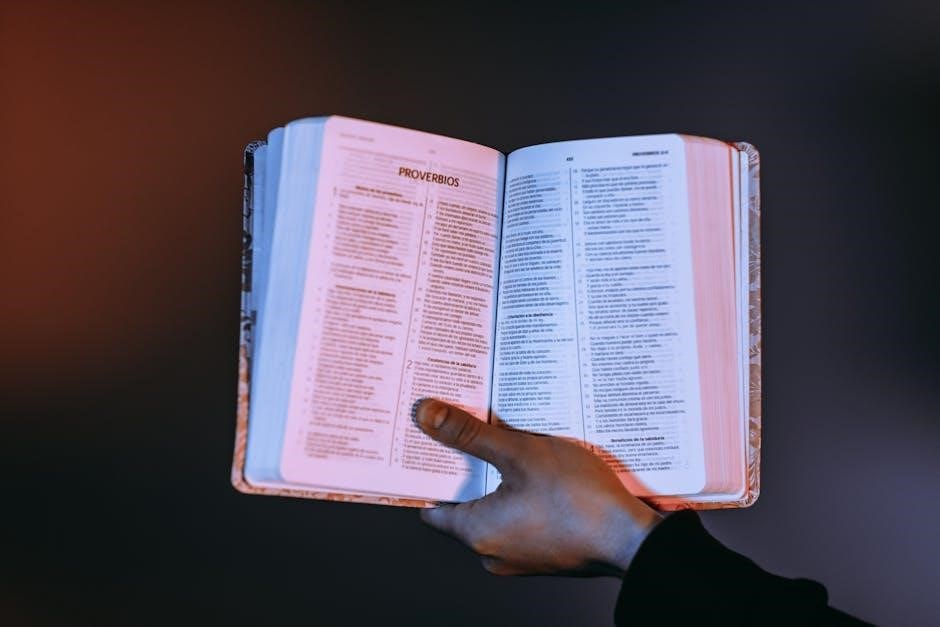The 72 Names of God‚ derived from Exodus‚ are three-letter Hebrew combinations used in Kabbalah. They aid meditation‚ healing‚ and embody divine attributes for transformation and connection. PDF guides offer insights and practical applications.
Overview of the 72 Names of God
The 72 Names of God are sacred combinations of Hebrew letters derived from the Torah‚ specifically Exodus. Each name represents a unique divine attribute and spiritual energy. These three-letter sequences are believed to hold mystical powers‚ offering tools for meditation‚ healing‚ and personal transformation. Rooted in Kabbalah‚ they are used to connect with divine vibrations and manifest positive change. PDF guides and charts detail their meanings‚ practical applications‚ and spiritual intentions‚ making them accessible for those seeking deeper understanding and connection to divine energy. They serve as a bridge between the physical and spiritual realms‚ fostering growth and enlightenment.
Significance in Kabbalah and Spiritual Practices
The 72 Names of God hold profound significance in Kabbalah as sacred tools for spiritual growth and divine connection. Each name embodies a unique aspect of divine energy‚ allowing practitioners to tap into specific attributes such as healing‚ protection‚ and clarity. In spiritual practices‚ these names are used to align with divine vibrations‚ fostering inner transformation and enlightenment. They are integral to meditation‚ serving as focal points to transcend limitations and manifest positive change. By invoking these names‚ individuals seek to harmonize with divine intent‚ fostering a deeper sense of purpose and spiritual awakening. Their power is deeply rooted in Kabbalistic tradition‚ offering timeless wisdom for seekers.

Origins and History of the 72 Names
The 72 Names of God originate from the Book of Exodus‚ specifically Exodus 14:19-21. These three-letter combinations were first revealed in Jewish mysticism‚ later becoming central to Kabbalah‚ offering spiritual tools for divine connection and transformation.
Biblical Roots and the Book of Exodus
The 72 Names of God are deeply rooted in the Book of Exodus‚ specifically within the narrative of the Red Sea miracle (Exodus 14:19-21). These three-letter combinations are derived from consecutive letters in the Hebrew text‚ forming a divine code of spiritual significance.
Each name embodies a unique aspect of God’s nature‚ offering tools for meditation‚ healing‚ and connection to divine energy. Their biblical origins link them to ancient mystical traditions‚ making them a cornerstone of Kabbalistic practice and a pathway to spiritual transformation‚ as detailed in PDF guides and Kabbalah texts.

Historical Development in Kabbalistic Tradition
The 72 Names of God have evolved significantly within Kabbalistic tradition‚ tracing back to ancient mystical teachings. They were systematized in the Middle Ages‚ with the Zohar and other texts highlighting their spiritual significance. Kabbalists viewed these names as tools for connecting with divine attributes and accessing hidden energies. Over time‚ their use expanded to include meditation‚ healing‚ and protection‚ becoming central to Jewish mysticism. These names are now used globally for spiritual growth‚ reflecting their enduring influence. Their historical development underscores their role as a bridge between the divine and human realms‚ as explored in Kabbalistic texts and PDF guides.

Structure and Formation of the Names
The 72 Names of God are formed from three-letter Hebrew combinations‚ derived from Exodus. Each name represents a unique divine attribute‚ structured to align with specific spiritual intentions and energies.
Hebrew Letter Combinations and Triplets
The 72 Names of God are formed from specific three-letter combinations of Hebrew letters‚ derived from verses in the Book of Exodus. Each triplet embodies a unique divine attribute‚ serving as a spiritual tool to connect with divine energy and intentions. These combinations are believed to reveal hidden aspects of God’s nature‚ offering profound mystical and practical applications. They are often used in meditation and healing practices‚ with each name associated with specific intentions and vibrational energies. The structure of these triplets is central to their power‚ making them a cornerstone of Kabbalistic tradition and spiritual practices.
Sequence in the Torah and Divine Attributes
The 72 Names of God are intricately linked to specific sequences within the Torah‚ particularly in the Book of Exodus. These divine attributes are encoded in the text‚ revealing profound spiritual truths. Each name corresponds to a unique aspect of God’s nature‚ such as compassion‚ strength‚ or wisdom. The sequence of these names follows the narrative of Exodus‚ reflecting the unfolding of divine energy. By understanding their placement‚ one can tap into their vibrational powers‚ aligning with divine intentions for personal transformation and spiritual growth. This sacred arrangement is a cornerstone of Kabbalistic teachings‚ offering deep insights into God’s infinite attributes and their practical applications.

Meanings and Interpretations of the Names
The 72 Names of God are three-letter combinations from Exodus‚ representing divine attributes like mercy‚ strength‚ and wisdom. They are tools for spiritual connection and transformation.
Spiritual and Mystical Significance
The 72 Names of God hold profound spiritual and mystical significance in Kabbalah. Each three-letter combination represents a unique divine attribute‚ offering a gateway to connect with divine energy. These names embody the essence of creation‚ mercy‚ justice‚ and wisdom‚ allowing practitioners to align with specific vibrational frequencies. Meditating on these names is believed to unlock spiritual transformation‚ healing‚ and protection. They serve as tools for transcending limitations‚ fostering inner peace‚ and manifesting positive change. By engaging with these sacred names‚ individuals can access higher states of consciousness and deepen their spiritual journey. Their mystical power lies in their ability to bridge the human and divine realms.
Practical Applications in Meditation and Healing
The 72 Names of God are widely used in meditation and healing practices to connect with divine energy. Each name corresponds to specific intentions‚ such as protection‚ healing‚ or abundance. By focusing on these names during meditation‚ practitioners believe they can align with divine attributes and manifest positive change. PDF guides and charts often pair each name with its meaning‚ providing a structured approach for meditation. For instance‚ one name might offer protection from negativity‚ while another fosters emotional healing. These practices aim to channel spiritual energy for personal transformation‚ making the 72 Names a powerful tool for those seeking holistic well-being and spiritual growth.

Using the 72 Names for Meditation
The 72 Names of God are used in meditation to connect with divine energy and manifest intentions. Each name aligns with specific attributes‚ fostering spiritual growth and transformation.
Guided Meditation Techniques
Guided meditation techniques using the 72 Names of God involve focusing on specific Hebrew letter combinations. These sequences‚ arranged into triplets‚ are believed to connect practitioners with divine attributes. Charts often match each name to its spiritual intention‚ such as protection‚ healing‚ or abundance. During meditation‚ one might recite the names‚ visualize their meanings‚ or contemplate their vibrational energies. Techniques include deep breathing‚ silent reflection‚ or chanting to align with the divine. The process is said to enhance intuition‚ manifest positive change‚ and foster inner peace. Regular practice is encouraged to fully embrace the transformative power of these sacred names.
Connecting with Divine Energy and Intentions
The 72 Names of God are powerful tools for connecting with divine energy and aligning with sacred intentions. Derived from Exodus‚ these three-letter Hebrew combinations embody specific divine attributes‚ enabling practitioners to tap into their vibrational frequencies. By focusing on a particular name during meditation or chanting‚ one can access its unique energy‚ fostering spiritual growth and transformation. Each name corresponds to a divine intention‚ such as protection‚ healing‚ or abundance‚ allowing individuals to harmonize their actions with divine will. This practice is believed to deepen one’s connection to the divine‚ manifest positive change‚ and enhance spiritual awareness.

Safety and Precautions
Using the 72 Names of God requires respect and purity of intention. Misuse may lead to negative consequences‚ so seek guidance from knowledgeable practitioners to ensure safe application.
Responsible Use of Sacred Names
The 72 Names of God are sacred and powerful tools requiring respect and care. Using them without proper intention or knowledge can lead to unintended consequences.
Practitioners must approach these names with purity of heart and mindfulness of their divine origin. Consulting knowledgeable guides ensures safe and ethical use‚ aligning with their intended spiritual purpose.
Avoiding Misuse and Negative Consequences
The 72 Names of God are powerful spiritual tools that demand respect and ethical use. Misusing them can invite negativity or harm‚ emphasizing the need for pure intentions and mindfulness. PDF guides often warn against improper use‚ such as employing the names for personal gain or malicious purposes.

To avoid negative consequences‚ one must study the names with reverence‚ understanding their divine origins. Consulting knowledgeable practitioners ensures safe and ethical application‚ fostering a harmonious connection with their sacred energy.

Resources and References
PDF guides and posters provide detailed insights into the 72 Names of God‚ offering meanings and meditative practices. Visit hebrewrootsmom.com for comprehensive resources and charts.
PDF Guides and Kabbalah Posters
PDF guides and Kabbalah posters are invaluable resources for exploring the 72 Names of God. These materials provide detailed charts‚ Hebrew letter combinations‚ and meanings‚ serving as tools for meditation and spiritual practice. Posters‚ such as the 28-inch x 36-inch version‚ visually organize the names‚ making them accessible for study and reflection. Websites like hebrewrootsmom.com offer comprehensive downloads‚ enabling users to deepen their understanding of each name’s significance. These resources are particularly beneficial for meditators and healers seeking to connect with divine energy and attributes embedded in the names. They are designed to enhance spiritual journeys and practical applications of the 72 Names.

Recommended Reading and Study Materials
For deeper exploration‚ numerous resources are available‚ including PDF guides and books. A notable publication‚ “The 72 Names of God” from 2004‚ offers insights into their mystical significance. Additionally‚ materials like “Kabbalistic Meditations” provide practical techniques. Websites such as hebrewrootsmom.com offer downloadable charts and posters. For further study‚ explore books on Kabbalah and Jewish mysticism‚ which contextualize the names within broader spiritual frameworks. Videos and guided meditations on platforms like YouTube also complement textual resources‚ aiding in immersive learning. These materials cater to both beginners and advanced practitioners‚ ensuring a comprehensive understanding of the 72 Names and their applications in meditation and healing.
The 72 Names of God are profound spiritual tools offering transformation and connection. Embrace their power through meditation‚ affirming their divine energy for healing and personal growth.
Final Thoughts on the 72 Names of God
The 72 Names of God are a sacred Kabbalistic tool‚ offering profound spiritual insights and transformative power. Each name embodies divine attributes‚ enabling connection to higher consciousness and energy. Used in meditation‚ they align intentions with divine will‚ fostering healing‚ protection‚ and personal growth. Their timeless wisdom guides seekers to balance and harmony‚ reflecting the infinite and mysterious nature of the Divine. Embracing these names deepens spiritual practice‚ inviting individuals to explore their inner potential and align with universal truths.
Encouragement for Further Exploration
Exploring the 72 Names of God offers a profound journey into spirituality and self-discovery. PDF guides and Kabbalah posters provide accessible tools for deeper study. Engaging with these sacred names through meditation and reflection can unlock their transformative power. Seekers are encouraged to delve into recommended readings and guided meditations to enhance their understanding. The wisdom of the 72 Names invites personal growth‚ healing‚ and a closer connection to divine energy. Embrace this timeless tradition to illuminate your spiritual path and uncover the hidden meanings embedded in these powerful combinations of Hebrew letters.
